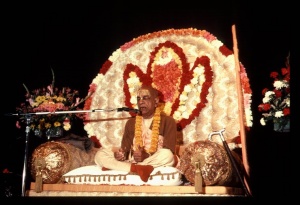CC Madhya 16.214-215: Difference between revisions
m (1 revision(s)) |
(Vanibot #0054 edit - transform synonyms into clickable links, which search similar occurrences) |
||
| (One intermediate revision by one other user not shown) | |||
| Line 1: | Line 1: | ||
{{ | [[Category:Sri Caitanya-caritamrta - Madhya-lila Chapter 16|C214]] | ||
<div style="float:left">'''[[Sri Caitanya-caritamrta|Śrī Caitanya-caritāmṛta]] - [[CC Madhya|Madhya-līlā]] - [[CC Madhya 16|Chapter 16: The Lord's Attempt to Go to Vṛndāvana]]'''</div> | |||
<div style="float:right">[[File:Go-previous.png|link=CC Madhya 16.213|Madhya-līlā 16.213]] '''[[CC Madhya 16.213|Madhya-līlā 16.213]] - [[CC Madhya 16.216|Madhya-līlā 16.216]]''' [[File:Go-next.png|link=CC Madhya 16.216|Madhya-līlā 16.216]]</div> | |||
{{CompareVersions|CC|Madhya 16.214-215|CC 1975|CC 1996}} | |||
{{RandomImage}} | |||
==== TEXTS 214-215 ==== | ==== TEXTS 214-215 ==== | ||
<div | <div class="verse"> | ||
tāra madhye mililā yaiche rūpa-sanātana | :tāra madhye mililā yaiche rūpa-sanātana | ||
nṛsiṁhānanda kaila yaiche pathera sājana | :nṛsiṁhānanda kaila yaiche pathera sājana | ||
sūtra-madhye sei līlā āmi | :sūtra-madhye sei līlā āmi ta' varṇiluṅ | ||
ataeva punaḥ tāhā ihāṅ nā likhiluṅ | :ataeva punaḥ tāhā ihāṅ nā likhiluṅ | ||
</div> | </div> | ||
| Line 14: | Line 18: | ||
==== SYNONYMS ==== | ==== SYNONYMS ==== | ||
<div | <div class="synonyms"> | ||
tāra | ''[//vanipedia.org/wiki/Special:VaniSearch?s=tāra&tab=syno_o&ds=1 tāra] [//vanipedia.org/wiki/Special:VaniSearch?s=madhye&tab=syno_o&ds=1 madhye]'' — within that; ''[//vanipedia.org/wiki/Special:VaniSearch?s=mililā&tab=syno_o&ds=1 mililā]'' — He met; ''[//vanipedia.org/wiki/Special:VaniSearch?s=yaiche&tab=syno_o&ds=1 yaiche]'' — how; ''[//vanipedia.org/wiki/Special:VaniSearch?s=rūpa&tab=syno_o&ds=1 rūpa]-[//vanipedia.org/wiki/Special:VaniSearch?s=sanātana&tab=syno_o&ds=1 sanātana]'' — the two brothers Rūpa and Sanātana; ''[//vanipedia.org/wiki/Special:VaniSearch?s=nṛsiṁhānanda&tab=syno_o&ds=1 nṛsiṁhānanda]'' — Nṛsiṁhānanda; ''[//vanipedia.org/wiki/Special:VaniSearch?s=kaila&tab=syno_o&ds=1 kaila]'' — did; ''[//vanipedia.org/wiki/Special:VaniSearch?s=yaiche&tab=syno_o&ds=1 yaiche]'' — how; ''[//vanipedia.org/wiki/Special:VaniSearch?s=pathera&tab=syno_o&ds=1 pathera] [//vanipedia.org/wiki/Special:VaniSearch?s=sājana&tab=syno_o&ds=1 sājana]'' — decoration of the road; ''[//vanipedia.org/wiki/Special:VaniSearch?s=sūtra&tab=syno_o&ds=1 sūtra]-[//vanipedia.org/wiki/Special:VaniSearch?s=madhye&tab=syno_o&ds=1 madhye]'' — in the synopsis; ''[//vanipedia.org/wiki/Special:VaniSearch?s=sei&tab=syno_o&ds=1 sei] [//vanipedia.org/wiki/Special:VaniSearch?s=līlā&tab=syno_o&ds=1 līlā]'' — those pastimes; ''[//vanipedia.org/wiki/Special:VaniSearch?s=āmi&tab=syno_o&ds=1 āmi]'' — I; ''[//vanipedia.org/wiki/Special:VaniSearch?s=ta&tab=syno_o&ds=1 ta] '' — indeed; ''[//vanipedia.org/wiki/Special:VaniSearch?s=varṇiluṅ&tab=syno_o&ds=1 varṇiluṅ]'' — have described; ''[//vanipedia.org/wiki/Special:VaniSearch?s=ataeva&tab=syno_o&ds=1 ataeva]'' — therefore; ''[//vanipedia.org/wiki/Special:VaniSearch?s=punaḥ&tab=syno_o&ds=1 punaḥ]'' — again; ''[//vanipedia.org/wiki/Special:VaniSearch?s=tāhā&tab=syno_o&ds=1 tāhā]'' — that; ''[//vanipedia.org/wiki/Special:VaniSearch?s=ihāṅ&tab=syno_o&ds=1 ihāṅ]'' — here; ''[//vanipedia.org/wiki/Special:VaniSearch?s=nā&tab=syno_o&ds=1 nā] [//vanipedia.org/wiki/Special:VaniSearch?s=likhiluṅ&tab=syno_o&ds=1 likhiluṅ]'' — I have not written. | ||
</div> | </div> | ||
| Line 21: | Line 25: | ||
==== TRANSLATION ==== | ==== TRANSLATION ==== | ||
<div | <div class="translation"> | ||
Those narrations tell how Śrī Caitanya Mahāprabhu met the brothers Rūpa and Sanātana and how Nṛsiṁhānanda decorated the road. I have already described these in an earlier synopsis of this book; therefore I will not repeat the narrations here. | Those narrations tell how Śrī Caitanya Mahāprabhu met the brothers Rūpa and Sanātana and how Nṛsiṁhānanda decorated the road. I have already described these in an earlier synopsis of this book; therefore I will not repeat the narrations here. | ||
</div> | </div> | ||
| Line 28: | Line 32: | ||
==== PURPORT ==== | ==== PURPORT ==== | ||
<div | <div class="purport"> | ||
This information is given in Adi-līlā 10.35 and Madhya-līlā 1.155-162 and 175-226. | This information is given in ''Adi-līlā'' 10.35 and ''Madhya-līlā'' 1.155-162 and 175-226. | ||
</div> | </div> | ||
__NOTOC__ | |||
<div style="float:right; clear:both;">[[File:Go-previous.png|link=CC Madhya 16.213|Madhya-līlā 16.213]] '''[[CC Madhya 16.213|Madhya-līlā 16.213]] - [[CC Madhya 16.216|Madhya-līlā 16.216]]''' [[File:Go-next.png|link=CC Madhya 16.216|Madhya-līlā 16.216]]</div> | |||
__NOTOC__ | |||
__NOEDITSECTION__ | |||
Latest revision as of 22:04, 19 February 2024

A.C. Bhaktivedanta Swami Prabhupada
TEXTS 214-215
- tāra madhye mililā yaiche rūpa-sanātana
- nṛsiṁhānanda kaila yaiche pathera sājana
- sūtra-madhye sei līlā āmi ta' varṇiluṅ
- ataeva punaḥ tāhā ihāṅ nā likhiluṅ
SYNONYMS
tāra madhye — within that; mililā — He met; yaiche — how; rūpa-sanātana — the two brothers Rūpa and Sanātana; nṛsiṁhānanda — Nṛsiṁhānanda; kaila — did; yaiche — how; pathera sājana — decoration of the road; sūtra-madhye — in the synopsis; sei līlā — those pastimes; āmi — I; ta — indeed; varṇiluṅ — have described; ataeva — therefore; punaḥ — again; tāhā — that; ihāṅ — here; nā likhiluṅ — I have not written.
TRANSLATION
Those narrations tell how Śrī Caitanya Mahāprabhu met the brothers Rūpa and Sanātana and how Nṛsiṁhānanda decorated the road. I have already described these in an earlier synopsis of this book; therefore I will not repeat the narrations here.
PURPORT
This information is given in Adi-līlā 10.35 and Madhya-līlā 1.155-162 and 175-226.